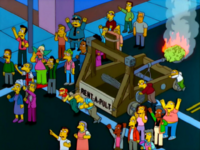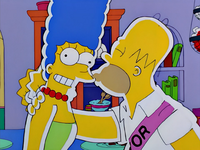
Difference between revisions of "A Tale of Two Springfields/References"
Wikisimpsons - The Simpsons Wiki
(→Cultural references) |
(→The Who references) |
||
| (14 intermediate revisions by 5 users not shown) | |||
| Line 4: | Line 4: | ||
== Cultural references == | == Cultural references == | ||
*The title of the episode is a reference to the book ''{{W|A Tale of Two Cities}}'' by [[Charles Dickens]]. | *The title of the episode is a reference to the book ''{{W|A Tale of Two Cities}}'' by [[Charles Dickens]]. | ||
| − | *The Springfield Wall is a parody of the | + | *The Springfield Wall is a parody of the [[Berlin Wall]], which stood at the border of the cities of {{W|West Berlin}} and {{W|East Berlin}} between 1961 and 1989. Marge even mentions the Berlin Wall when Homer considers constructing the wall. Like Springfield in this episode, the city of [[Berlin]] was also at one point divided, between 1945 and 1990. New Springfield, which erected the wall, plays the role of {{W|East Germany}}, which constructed the Berlin Wall in 1961, while Olde Springfield plays the role of {{W|West Germany}}. |
*The [[Chalkboard gag|blackboard gag]] refers to the {{W|United States presidential election, 2000|presidential election}} which was two days after the episode was aired. A controversy surrounding the election was the supposed use of subliminal messages. | *The [[Chalkboard gag|blackboard gag]] refers to the {{W|United States presidential election, 2000|presidential election}} which was two days after the episode was aired. A controversy surrounding the election was the supposed use of subliminal messages. | ||
*The timing of the episode coincides with [[Matt Groening]]'s native northwest [[Oregon]] splitting into two overlapping area codes ({{W|Area code 503}} and {{W|Area code 971}}). Such a {{W|split plan}} was often unpopular due to existing phone numbers changing, and now the alternative method is an {{W|overlay plan}}, whereby an area is given a new code for new numbers but existing numbers do not change. | *The timing of the episode coincides with [[Matt Groening]]'s native northwest [[Oregon]] splitting into two overlapping area codes ({{W|Area code 503}} and {{W|Area code 971}}). Such a {{W|split plan}} was often unpopular due to existing phone numbers changing, and now the alternative method is an {{W|overlay plan}}, whereby an area is given a new code for new numbers but existing numbers do not change. | ||
| Line 13: | Line 13: | ||
*Homer telling the {{W|Arizona Cardinals}} representative to "keep walking" is a reference to how poor the Cardinals franchise had been at the time the episode was created. | *Homer telling the {{W|Arizona Cardinals}} representative to "keep walking" is a reference to how poor the Cardinals franchise had been at the time the episode was created. | ||
*[[Homer]] imagines himself as a mayor, walking down the street in a Western town, wearing a cowboy hat and firing a rifle, in a parody of the opening credit of the Western show ''{{W|The Rifleman}}'' starring {{W|Chuck Connors}}. | *[[Homer]] imagines himself as a mayor, walking down the street in a Western town, wearing a cowboy hat and firing a rifle, in a parody of the opening credit of the Western show ''{{W|The Rifleman}}'' starring {{W|Chuck Connors}}. | ||
| − | *After they receive the gold from the river, [[Kent Brockman]] does an editorial about it and thanks Homer, saying that they will all be covered in {{W|Urolagnia|golden showers}} (a sexual term for | + | *After they receive the gold from the river, [[Kent Brockman]] does an editorial about it and thanks Homer, saying that they will all be covered in {{W|Urolagnia|golden showers}} (a sexual term for urinating on another person). He does not get it but the people off to the side laugh hysterically. |
| − | *Krusty mentioned that he opened for The Who at | + | *Krusty mentioned that he opened for The Who at [[Woodstock]]. |
*The scene of Olde Springfield's "patriots" disguised as Native Americans throwing beer destined for New Springfield into the river is a reference to the "{{W|Boston tea party}}" episode of the American independence. | *The scene of Olde Springfield's "patriots" disguised as Native Americans throwing beer destined for New Springfield into the river is a reference to the "{{W|Boston tea party}}" episode of the American independence. | ||
*While waiting for {{Chs|The Who}}'s concert in Olde Springfield, [[Principal Skinner]] seems to be dressed in {{W2|Mod|lifestyle|Mod attire}}. [[Edna Krabappel]] is dressed as a typical {{W|groupie}}. | *While waiting for {{Chs|The Who}}'s concert in Olde Springfield, [[Principal Skinner]] seems to be dressed in {{W2|Mod|lifestyle|Mod attire}}. [[Edna Krabappel]] is dressed as a typical {{W|groupie}}. | ||
| Line 30: | Line 30: | ||
*The Who were also famous for breaking down the furnishings of their hotel rooms. | *The Who were also famous for breaking down the furnishings of their hotel rooms. | ||
*Of the Who only three members speak, [[Roger Daltrey]], [[John Entwistle]] and {{W|Pete Townshend}}. The fourth member, the drummer {{W|Keith Moon}} is seen very little and he is always in the background. He was the drummer in the Who's heyday, known for being a drum destroyer and died in 1978. | *Of the Who only three members speak, [[Roger Daltrey]], [[John Entwistle]] and {{W|Pete Townshend}}. The fourth member, the drummer {{W|Keith Moon}} is seen very little and he is always in the background. He was the drummer in the Who's heyday, known for being a drum destroyer and died in 1978. | ||
| − | *When The Who orders Homer to tear down the wall, the moment is quite similar to movie ''{{W|The Wall}}'' by [[Pink Floyd]], in which the main character is ordered to tear down the wall in his head, that alienates him from the world. | + | *When The Who orders Homer to tear down the wall, the moment is quite similar to movie ''{{W|Pink Floyd – The Wall|The Wall}}'' by [[Pink Floyd]], in which the main character is ordered to tear down the wall in his head, that alienates him from the world. |
*The song played right before the end credits is "[[Won't Get Fooled Again]]" and not Homer's request of "{{W|Pinball Wizard}}". | *The song played right before the end credits is "[[Won't Get Fooled Again]]" and not Homer's request of "{{W|Pinball Wizard}}". | ||
| Line 56: | Line 56: | ||
*As the Simpson family's picture is taken, the flash effect is misaligned so that it looks like Lisa briefly has two heads. | *As the Simpson family's picture is taken, the flash effect is misaligned so that it looks like Lisa briefly has two heads. | ||
*In the scene seen on the right, there appears to be two [[Kirk Van Houten]]s, one pushing the catapult, one in the crowd near it. | *In the scene seen on the right, there appears to be two [[Kirk Van Houten]]s, one pushing the catapult, one in the crowd near it. | ||
| − | + | *[[Milhouse]] is seen playing with [[Bart]] in New Springfield's Park, when both of his parents are shown to be in Olde Springfield. | |
{{Season 12|R}} | {{Season 12|R}} | ||
{{DEFAULTSORT:Tale of Two Springfields, A}} | {{DEFAULTSORT:Tale of Two Springfields, A}} | ||
Latest revision as of 18:13, September 29, 2025
|
|||||||||
|
|
|
Cultural references[edit]
- The title of the episode is a reference to the book A Tale of Two Cities by Charles Dickens.
- The Springfield Wall is a parody of the Berlin Wall, which stood at the border of the cities of West Berlin and East Berlin between 1961 and 1989. Marge even mentions the Berlin Wall when Homer considers constructing the wall. Like Springfield in this episode, the city of Berlin was also at one point divided, between 1945 and 1990. New Springfield, which erected the wall, plays the role of East Germany, which constructed the Berlin Wall in 1961, while Olde Springfield plays the role of West Germany.
- The blackboard gag refers to the presidential election which was two days after the episode was aired. A controversy surrounding the election was the supposed use of subliminal messages.
- The timing of the episode coincides with Matt Groening's native northwest Oregon splitting into two overlapping area codes (Area code 503 and Area code 971). Such a split plan was often unpopular due to existing phone numbers changing, and now the alternative method is an overlay plan, whereby an area is given a new code for new numbers but existing numbers do not change.
- Todd's woodpecker laughs like Woody Woodpecker after it attacks Bart.
- Bill and Marty mention English actress Joan Collins.
- Bill and Marty use voice clips of an Austin Powers impression saying "oh, behave!" and of Gary Coleman saying "Whachu talkin' 'bout?".
- The scene with Homer, Lenny and Carl having lunch in the nuclear power plant has a reference to the movie Pulp Fiction. While writing the new area code on his hand, Homer complains that he already has enough things to remember and a close-up of his hand shows the writing "Lenny=White, Carl=Black." This is a reference to the second last scene in Pulp Fiction, in which The Wolf is called to help resolve a problem. On a pad of paper before he meets up with Vincent and Jules, he writes "Vincent-White, Jules-Black" in order to distinguish between the two.
- Homer telling the Arizona Cardinals representative to "keep walking" is a reference to how poor the Cardinals franchise had been at the time the episode was created.
- Homer imagines himself as a mayor, walking down the street in a Western town, wearing a cowboy hat and firing a rifle, in a parody of the opening credit of the Western show The Rifleman starring Chuck Connors.
- After they receive the gold from the river, Kent Brockman does an editorial about it and thanks Homer, saying that they will all be covered in golden showers (a sexual term for urinating on another person). He does not get it but the people off to the side laugh hysterically.
- Krusty mentioned that he opened for The Who at Woodstock.
- The scene of Olde Springfield's "patriots" disguised as Native Americans throwing beer destined for New Springfield into the river is a reference to the "Boston tea party" episode of the American independence.
- While waiting for The Who's concert in Olde Springfield, Principal Skinner seems to be dressed in Mod attire. Edna Krabappel is dressed as a typical groupie.
- Homer asks The Who to play Grand Funk Railroad songs.
- Homer sings the song "Pac-Man Fever" by Buckner & Garcia.
- The last part of the final scene - where the badgers descend upon Springfield - shows one badger, much smaller than the rest, some distance behind the others. This is probably a reference to several similar Looney Tunes cartoons starring Sylvester, in which he is originally terrorized by a group of mice, but subsequently develops enough courage to "show them who's boss" and drive them all away. In each of these cartoons, the mice are shown fleeing the house, screaming and squeaking in fear, followed a little later by a baby mouse chattering incoherently in a voice that has been recorded at high speed.
The Who references[edit]
- When Kent Brockman's newscast shows a picture of Homer and friends on the steps of a home, the layout and poses match the back cover of The Who's compilation album Meaty Beaty Big and Bouncy.
- At the moment when Homer is introduced to The Who, the band is heard playing the closing chords of what appears to be "The Seeker". They later play the song in New Springfield.
- Homer mentions the songs "My Generation", "Won't Get Fooled Again" and "Squeeze Box".
- Moe's line "That fat, dumb, and bald guy sure plays some real hard ball" is a variation of a lyric in the song "Pinball Wizard" by The Who. The original lyric is "That deaf, dumb, and blind kid sure plays a mean pinball".
- The drummer who plays with The Who in this episode is clearly a cartoon version of Keith Moon.
- As soon as they meet The Who, Homer smashes a lamp and Bart kicks the drums, imitating Pete Townshend and Keith Moon who often smashed their guitar and drums during concerts.
- The Who were also famous for breaking down the furnishings of their hotel rooms.
- Of the Who only three members speak, Roger Daltrey, John Entwistle and Pete Townshend. The fourth member, the drummer Keith Moon is seen very little and he is always in the background. He was the drummer in the Who's heyday, known for being a drum destroyer and died in 1978.
- When The Who orders Homer to tear down the wall, the moment is quite similar to movie The Wall by Pink Floyd, in which the main character is ordered to tear down the wall in his head, that alienates him from the world.
- The song played right before the end credits is "Won't Get Fooled Again" and not Homer's request of "Pinball Wizard".
Trivia[edit]
- After Homer hears about the change of area code, the badger shows up and Homer goes "Go away! We got bigger problems now." This is a reference to the recurring sudden plot changes in most Simpson episodes.
- This is the 250th episode of the show.
- Area code 636 is actually assigned to suburbs of St. Louis, Missouri [1]; although this seems to reveal Springfield's state, the real Springfield, Missouri is in a different area code. Area code 939 is one of two codes used in Puerto Rico.
- This is the only episode of the Simpsons directed by Shaun Cashman.
- When Lisa is trying to find out what badgers eat she goes on whatbadgerseat.com. A real version of the site (whose logo is reminiscent of ask.com) was made by the producers of the show.
- The Simpsons' telephone number is given as 939-555-0113. The old area coded number of 636-555-0113 appears to connect to Mr. Burns; however, in "Lisa's Date with Density", his phone number was 555-0001.
- The phone number for the exterminators is 983-7668 (X-TERM-N-8).
- This is the last appearance of the Simpson family lawyer, Lionel Hutz. Since season 9 he has not spoken due to the death of his voice actor, Phil Hartman. This is his last appearance in the whole series.
- A deleted scene on the season 12 DVD shows that when Marge says that it's a little chilly, the singer replies "Shut the f*** up, Marge" before smacking her with the microphone. This scene was cut because of the profanity. Even if it was aired, it would have been bleeped out for the FCC. In T.V. airings, his line is dubbed to "Get out of the way, Marge."
Continuity[edit]
- The "angel skeleton" from "Lisa the Skeptic" can be seen in the wall dividing the cities.
- The Simpsons Comics story Wall or Nothing featured a similar plotline in which Springfield is divided over the issue of use and access to a lake.
- This is the first time Homer has had his body opened and his organs shown working. The second time was in "Treehouse of Horror XII" where the back of his skull was removed and his brain shown.
Goofs[edit]
- Bill from KBBL has black hair rather than his usual blue-grey hair.
- Both Principal Skinner and Apu are seen in Olde Springfield, despite them having been shown before as belonging to the middle class.
- As the Simpson family's picture is taken, the flash effect is misaligned so that it looks like Lisa briefly has two heads.
- In the scene seen on the right, there appears to be two Kirk Van Houtens, one pushing the catapult, one in the crowd near it.
- Milhouse is seen playing with Bart in New Springfield's Park, when both of his parents are shown to be in Olde Springfield.


